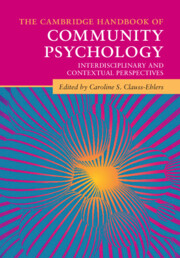Book contents
- The Cambridge Handbook of Community Psychology
- The Cambridge Handbook of Community Psychology
- Copyright page
- Dedication
- Contents
- Figures
- Tables
- Contributors
- Foreword
- Part I Foundational Concepts
- Part II Research, Assessment, and Program Evaluation
- Part III Community Psychology in Action
- Part IV Where Do We Go from Here?
- 29 Responding to Gaps in Research and Practice in Community Psychology
- 30 Rewriting the Community Psychology Narrative
- Index
- References
30 - Rewriting the Community Psychology Narrative
A Contextual, Interdisciplinary, Inclusive, Empowerment Approach
from Part IV - Where Do We Go from Here?
Published online by Cambridge University Press: 16 December 2021
- The Cambridge Handbook of Community Psychology
- The Cambridge Handbook of Community Psychology
- Copyright page
- Dedication
- Contents
- Figures
- Tables
- Contributors
- Foreword
- Part I Foundational Concepts
- Part II Research, Assessment, and Program Evaluation
- Part III Community Psychology in Action
- Part IV Where Do We Go from Here?
- 29 Responding to Gaps in Research and Practice in Community Psychology
- 30 Rewriting the Community Psychology Narrative
- Index
- References
Summary
This chapter addresses the gap between community psychology’s original social action focus and the current status of the literature. It concludes that the field has moved away from its original drive of social action and community empowerment, leaving a disconnection between community psychology’s initial aspirations (e.g., social justice, empowerment, community support) and the reality of the field in terms of theoretical, research, and practice output. Changing the community psychology narrative, as operationalized by the previous chapters, is deemed necessary so that community psychologists can further engage in reflexivity about power dynamics and privilege, consider sociopolitical aspects of communities, and participate in interdisciplinary collaboration both domestically and transnationally. Critical areas needed to change the community psychology narrative are presented. These include: diversifying theoretical approaches; diversifying research approaches and methods; making practice more accessible through the development of community mental health care that addresses the needs of diverse groups; incorporating a participatory pedagogy in teaching; and restructuring tenure and promotion processes so that collaboration, transnational work, and nonquantitative approaches are rewarded.
Keywords
- Type
- Chapter
- Information
- The Cambridge Handbook of Community PsychologyInterdisciplinary and Contextual Perspectives, pp. 653 - 664Publisher: Cambridge University PressPrint publication year: 2021

